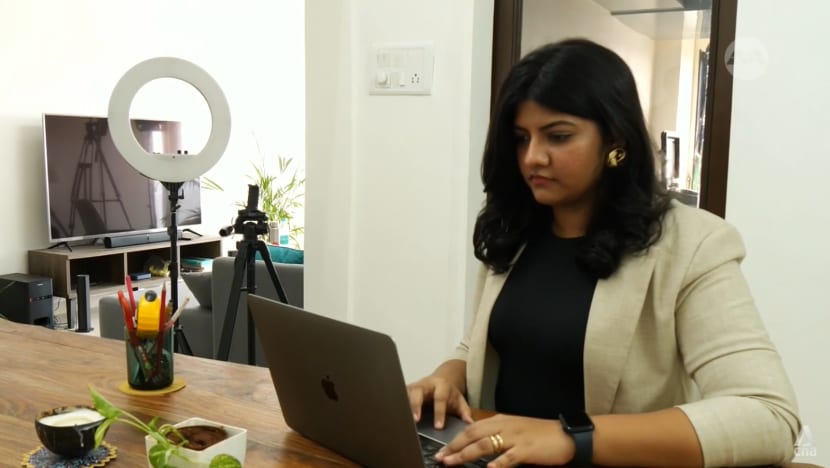As online financial influencers gain popularity in India, regulators attempt to clamp down on rogue players
The dramatic rise of “finfluencers” coincided with a boom in the stock market, the ease of online trading, and the COVID-19 pandemic.

Ms Ashna Tolkar is among a growing number of financial content creators putting up information on social media.

This audio is generated by an AI tool.
MUMBAI: Ms Ashna Tolkar started posting Instagram videos about personal finance three years ago at the age of just 19, while studying for a finance degree.
She wanted to share her views on how to save and manage money with fast-paced simple videos that anybody, young or old, could learn from.
“Every person should be aware about their money, their finances,” she told CNA.
Today, what started out as a fun side gig for her has become a fairly lucrative full-time job, with brand deals and online courses.
Ms Tolkar has 115,000 followers, mainly among young urbanites aged 18 to 35.
She declined to disclose her earnings but said an established influencer in India can make between US$1,200 and US$6,000 a month.
GROWTH OF ONLINE FINANCIAL INFLUENCERS
Financial influencers like Ms Tolkar are a fast-growing segment among the 3.5 million content creators in India.
Their dramatic rise coincided with a boom in the stock market, the ease of online trading, and the COVID-19 pandemic.
Millions of ordinary citizens in India - where the financial literacy rate stands at 27 per cent - were eager to invest and many of them went online in search of advice.
However, a lack of regulation has led to unscrupulous behaviour such as charging subscription fees for which users get little or nothing in return.
The market is also rife with so-called "pump-and-dump" schemes, where investors are urged to buy a particular stock so that its value is artificially inflated. The individual behind the scheme then sells those shares to themselves at a profit.
Managing director of Mumbai-based Bexley Advisors, Mr Utkarsh Sinha, noted that online financial advice is a rapidly evolving space with no entry barriers. He added that influencers may be trusted even if they do not have qualifications.
“There's a lot of potential for mis-selling, for pump-and-dump schemes, and therefore regulation of this space is required,” he said.
“But at the same time … it's very difficult to swat these flies because they come out a dime a dozen.”
REGULATING FINANCIAL INFLUENCERS
Nevertheless, India's market regulator, the Securities and Exchange Board of India (SEBI), has been taking steps against potentially harmful content, in line with countries like the United Kingdom and Singapore which have rules on financial influencers in place.
Under the new SEBI regulations approved in June, entities like brokers and mutual funds are now barred from working with individuals who provide investment advice on stocks and bonds despite not being registered with the regulator.
In July, SEBI said it had identified almost 9,000 instances of misleading or unlawful social media content related to markets.
It has since urged platforms to take legal action and is looking at ways to help people register as investment advisors. Nevertheless, it acknowledged that its requirements, regarded as tough, have led to limited take-up.
Related:
PRAISE FOR NEW RULE
The new rule has been lauded by the independent Advertising Standards Council of India, which last year issued its own guidelines requiring financial influencers to disclose their qualifications before giving advice.
“This is a recognition of the fact that “finfluencers” (financial influencers) are growing in popularity, that their opinions do matter to consumers,” said the council’s CEO Manisha Kapoor.
“Financial products are not necessarily very easy to understand, so there is also merit in financial influencers actually demystifying (them),” she added.
The new compliance rules have not been having a major impact on Ms Tolkar, who said her focus is on giving broad financial advice.
On her part, she is upfront about not being a registered investment advisor and avoids giving explicit tips about which stocks to buy or sell, she said.
For financial influencers like her who have built a thriving career online, the hope is that as regulators show more interest in the sector, there will be greater trust in those who do play by the rules.















